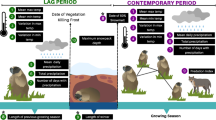Abstract
Huddling allows emperor penguins to conserve energy and survive their long winter fast while facing harsh climatic conditions. Here we report the first investigation into the effects of changes in wind speed and ambient temperature on different components of penguin huddling behaviour. We attached light and temperature recorders to male emperor penguins at the Pointe Géologie colony, Antarctica, which recorded huddling events. We then compared the frequency, duration, occurrence and intensity of huddling bouts, with ambient air temperatures and wind speeds. Huddling occurrence increased with lower ambient temperatures and higher wind speeds, whereas huddling intensity was mainly enhanced by lower ambient temperatures. Moreover, huddling group movements were linked to wind direction and its global density to lower ambient temperatures. Hence, emperor penguins complex huddling behaviour was modulated differently depending on these two parameters. Weather conditions may then affect emperor penguins ability to save energy and survive their winter fast.




Similar content being viewed by others
References
Ancel A, Visser H, Handrich Y, Masman D, Le Maho Y (1997) Energy saving in huddling penguins. Nature 385:304–305
Barbraud C, Weimerskirch H (2001) Emperor penguins and climate change. Nature 411:183–186
Batchelder P, Kinney RO, Demlow L, Lynch CB (1983) Effects of temperature and social interactions on huddling behavior in Mus musculus. Physiol Behav 31:97–102
Beal KG (1978) Temperature-dependent reduction of individual distance in captive House-Sparrows. Auk 95:195–196
Birr G (1968) Observations etho-écologiques à la colonie de manchots empereurs de Pointe Géologie en 1966. L’oiseau et la RFO 38:53–88
Canals M, Rosenmann M, Novoa FF, Bozinovic F (1998) Modulating factors of the energetic effectiveness of huddling in small mammals. Acta Theriol 43:337–348
Gilbert C, Le Maho Y, Robertson G, Naito Y, Ancel A (2006) Huddling behavior in emperor penguins: dynamics of huddling. Physiol Behav 88:479–488
Gilbert C, Le Maho Y, Perret M, Ancel A (2007) Body temperature changes induced by huddling in breeding male emperor penguins. Am J Physiol 292:R176–185
Groscolas R (1975) Effet d’une exposition à la chaleur sur la température corporelle et quelques paramètres hématologiques du manchot empereur, Aptenodytes forsteri. Comp Biochem Physiol 50A:533–543
Grubb TC Jr (1973) Absence of “individual distance” in the Tree Swallow during adverse weather. Auk 90:432–433
Jouventin P (1971) Comportement et structure sociale chez le manchot empereur. La Terre et la Vie 25:510–586
Kirkwood R, Robertson G (1999). The occurrence and purpose of huddling by emperor penguins during foraging trips. Emu 99:40–45
Le Bohec C, Gauthier-Clerc M, Le Maho Y (2005) Dynamics of crèche formation and the adaptive significance of crèching behaviour in the king penguin, Aptenodytes patagonicus. Anim Behav 70:527–538
Le Maho Y, Delclitte P, Chatonnet J (1976) Thermoregulation in fasting emperor penguins under natural conditions. Am J Physiol 231:913–922
Meservey WR, Kraus GF (1976) Absence of “individual distance” in three swallow species. Auk 93:177–178
Mougin J-L (1966) Observations écologiques à la colonie de manchots empereurs de Pointe Géologie (Terre Adélie) en 1964. L’oiseau et la RFO 36:167–226
Ostner J (2002) Social thermoregulation in redfronted lemurs (Eulemur fulvus rufus). Folia Primatol 73:175–180
Pinshow B, Fedak MA, Battles DR, Schmidt-Nielsen K (1976) Energy expenditure for thermoregulation and locomotion in emperor penguins. Am J Physiol 231:903–912
Prévost J (1961) Ecologie du manchot empereur, Expéditions polaires françaises. Hermann Press, Paris, 204 pp
Prévost J (1963) Influence des facteurs bio-climatiques sur le nomadisme des manchots empereurs à la colonie de Pointe Géologie. L’oiseau et la RFO 33:89–102
Smith SM (1972) Roosting aggregations of Bushtits in response to cold temperatures. Condor 74:478–479
Acknowledgments
Field work was financially and logistically supported by the Institut Polaire Français Paul-Emile Victor (IPEV) and the Terres Australes et Antarctiques Françaises (TAAF). All experiments were approved by the ethics committee of the French Polar Institute. Météo France generously provided meteorological data. We thank the 48th, 49th, 50th and 51st expedition at Dumont d’Urville station for technical assistance, and especially Mr. F. Blondel, J. Baudat and Y. Pont for their field work. We thank Dr. S. Blanc and Dr. M. Enstipp for manuscript revision.
Author information
Authors and Affiliations
Corresponding author
Rights and permissions
About this article
Cite this article
Gilbert, C., Robertson, G., Le Maho, Y. et al. How do weather conditions affect the huddling behaviour of emperor penguins?. Polar Biol 31, 163–169 (2008). https://doi.org/10.1007/s00300-007-0343-6
Received:
Revised:
Accepted:
Published:
Issue Date:
DOI: https://doi.org/10.1007/s00300-007-0343-6




